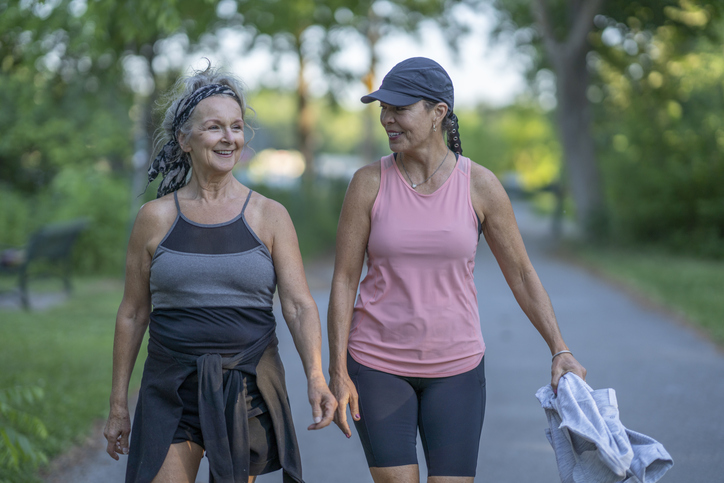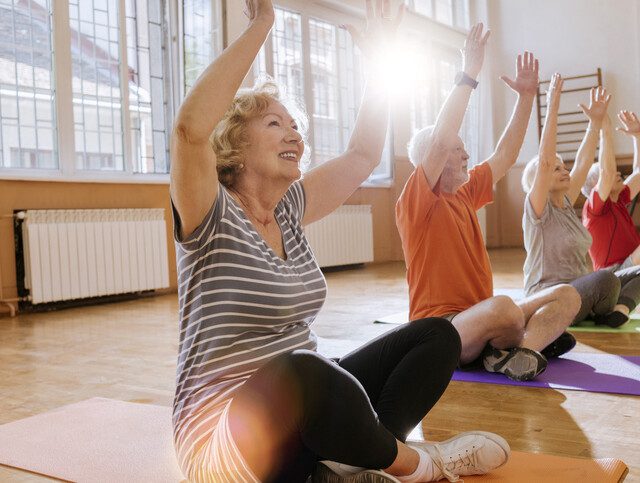We’ve all heard that regular physical activity has many health benefits. What many people don’t realize is that getting exercise doesn’t necessarily mean hours at the gym. It’s often as easy as putting on a pair of comfortable sneakers and heading outside for a walk.
Continue reading to learn about the benefits of walking and ways to walk more often.
Physical Benefits of Walking
The CDC recommends at least 150 minutes a week (for example, 30 minutes a day, five days a week) of “moderate-intensity physical activity” for older adults, such as brisk walking. That said, even getting in more gentle exercise on a regular basis can deliver big health benefits. However, always speak to a medical professional before making any changes to your exercise regime.
Going on regular walks has a number of physical benefits. Walking can help you:
- Maintain a healthy weight: The more you move your body the more calories you will burn. Combine your walking routine with a balanced diet for best results.
- Improve your cardiovascular health: Walking is a cardiovascular activity that increases your heart rate, which can improve blood flow and even lower blood pressure.
- Become stronger: Walking builds muscle strength and endurance. It can also help slow or prevent the degeneration of bones and joints that occurs as you age.
Strength and endurance gained from walking can even help older adults avoid falls.
Mental Benefits of Walking
Regular exercise is known to lessen symptoms associated with anxiety and depression. So it should be no surprise that going for regular walks can positively impact your mental health. You may find that you enjoy the mental benefits walking offers even more than the physical ones.
In addition to easing anxiety and depression, walking can also help:
- Boost mood and reduce stress: Walking causes your body to release hormones called endorphins, which help relax your muscles, relieve pain and reduce stress.
- Prevent cognitive decline: Studies have shown that walking and other aerobic exercises can improve brain health and thinking while preventing cognitive decline.
- Improve sleep quality: Walking during the day can help you achieve deeper and more restful sleep at night. Avoid exercise too close to bedtime, as that can keep you up.
Walking is also a great way to reduce loneliness. Forming a walking group with one or more people can help motivate you to stay active and provide some valuable socialization time.
Ways to Walk More Often
Studies have shown that walking just 10 minutes per day can help older adults live longer. Here are some easy ways to get in some extra steps each day.
- Explore your neighborhood: Walking is a great way to get out and explore your neighborhood. You might even notice things you never did before.
- Take the dog for a walk: Pet ownership has a number of benefits. If you have a dog, taking them out for regular walks can make you both healthier and happier.
- Walk while watching TV: Have a favorite program you don’t want to miss? Walking on a treadmill while watching TV is an easy way to get some steps.
- Take regular walking breaks: Consider building walking breaks into your day. A walk in the morning and a walk in the afternoon can help you stay energized.
- Walk to run errands: Have errands to run? Seek out opportunities to get in more steps. Park further away, use a different entrance or do an extra lap around the store.
Remember that starting a new exercise routine can be a challenge for anyone, especially if you have been inactive for a while or have existing health issues. It’s best to start slow. Then you can gradually work your way up to longer walks as you get more steps under your belt.
Live Well at Harbour’s Edge
At Harbour’s Edge, a senior living community in Delray Beach, Florida, we provide resources and opportunities for our residents to achieve their wellness goals. Our community offers a modern fitness center, scenic walking paths and a waterfront swimming pool, among other amenities. Contact us or complete the form below to learn more about living well at Harbour’s Edge.


